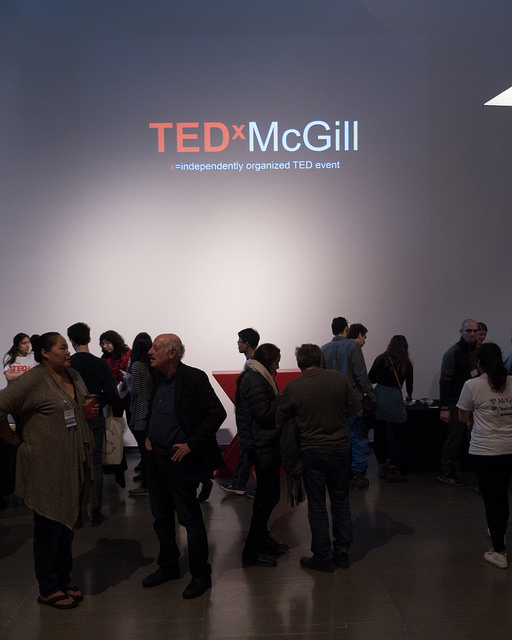On Nov. 11, TEDxMcGill held its fifth annual conference at Montreal’s McCord Museum. Over 100 passionate attendees from the McGill and Montreal communities filed into the museum to watch the series of talks, all of which were centred around the theme ‘giving voice.’ The lineup featured 10 speakers and musical performers in fields ranging from artificial intelligence to LGBTQ+ activism, all speaking on how their work has inspired positive change locally or globally.
From teaching music in indigenous communities to including inter-disciplinary space exploration, the diverse lineup of speakers demonstrated how essential hearing a multitude of voices is in everyday life.
The event’s musical performers interpreted ‘giving voice’ through their voices. Moe Clark and Ahau Marino—musicians, composers, and educators—performed two pieces at the event and used a multitude of musical techniques, such as a looping pedal that layered sound effects over live vocals, to convey music’s ability to empower. After years of exploring various genres of cultural sounds together and teaching music to Indigenous high school students, Clark and Marino have developed a strong partnership.
“Giving voice comes from, for us, using our bodies as the sight for connection, for creation, and for communication,” Clark said in an interview with The McGill Tribune. “And a lot of that comes from the creative capacity to build kinship. Some of that kinship comes from other performers, and artists. And some of that kinship comes from other forces.”
The diversity of fields represented at the conference reminded attendees that there are no limitations to how one can ‘give voice.’ One speaker, Olivia Nuamah, a community builder and activist, spoke about her experience serving as the executive director of Pride Toronto, one of the largest cultural events in North America. Nuamah’s work deals extensively with representing minority groups within the pride community.
“It’s too easy to look at that LGBTQ+ and think that the group is a whole bunch of the same people, when it’s not,” Nuamah told the Tribune. “It’s quite nuanced.”
She also encouraged students to get involved in LGBTQ+ activism, explaining that the first steps to doing so are to learn more about the community and to support local pride events.
“Lots of people are involved in Pride Toronto and Pride Montreal,” Nuamah said. “We’re looking for as many allies as possible to support what we’re trying to say.”
Another speaker, Paul Albert-Lebrun, U3 engineering, encouraged students to join the space conversation in his talk about the McGill Space Systems Group (MSSG). Albert-Lebrun co-founded the group with McGill alumni Angus McLean and Harris Innes-Miller, graduates in Engineering and Arts, respectively, in the class of 2015. Albert-Lebrun’s decision to create the MSSG stemmed from his interest in interdisciplinary space research. He encouraged students of all faculties to get involved in galactic dialogue—not just those in the field of science.
“I challenge everyone in the audience to think of how their discipline can get involved in space,” Albert-Lebrun told the Tribune. “Getting to space technologically shouldn’t be the only question. The question should be how we get there as a global society.”
Regardless of their area of expertise or major of study, attendees left the event feeling invigorated by the call to make an impact and give voice to others.









